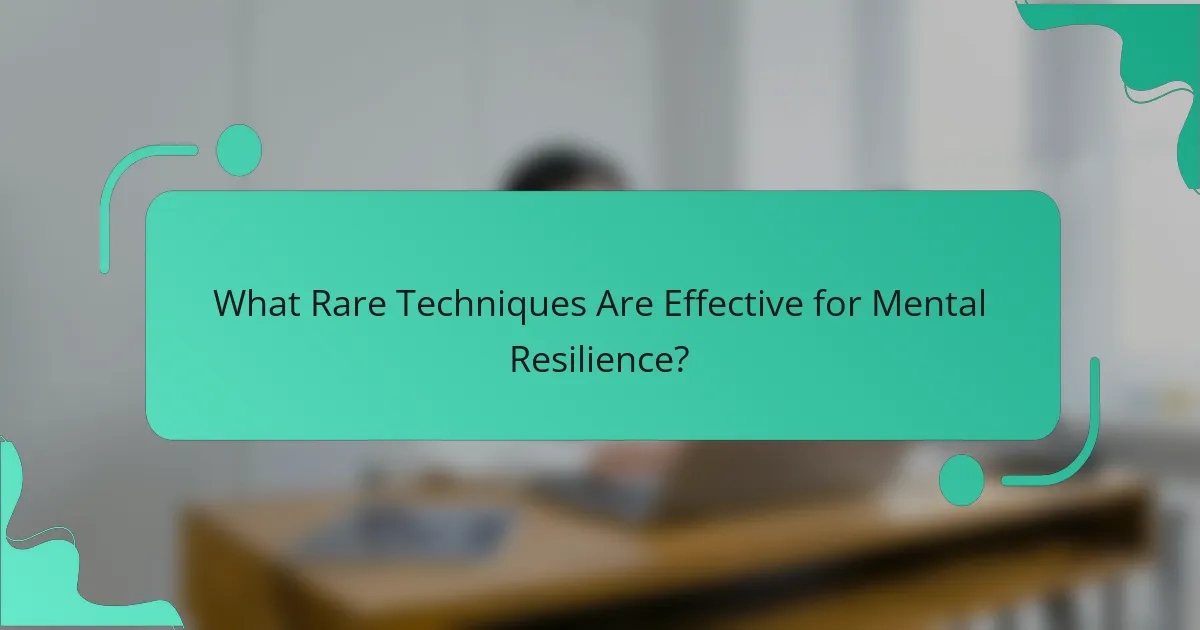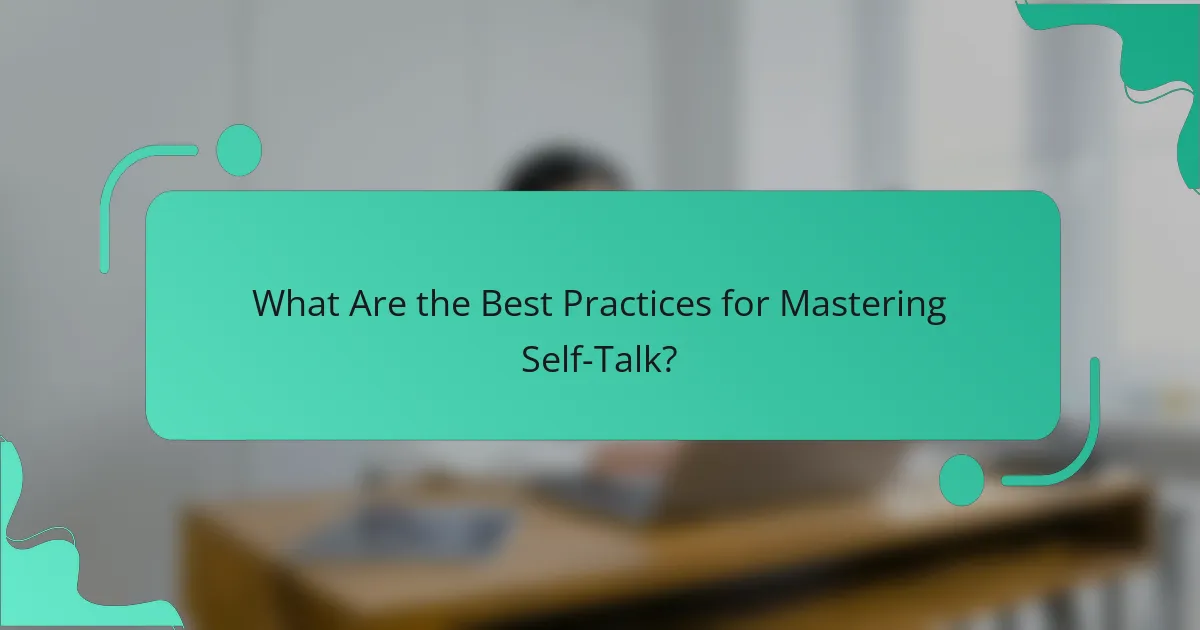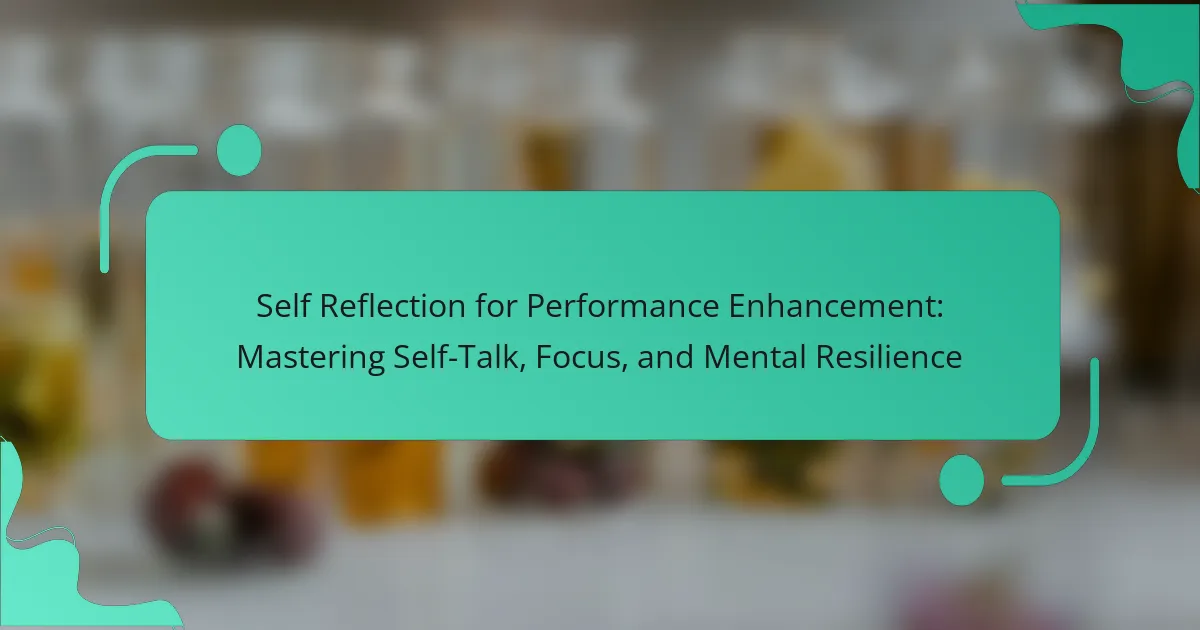Enhancing athletic performance requires effective self-reflection strategies. This article explores the impact of self-talk on focus and mental resilience. It discusses unique self-talk techniques, self-reflection methods like journaling and mindfulness, and best practices for mastering self-talk. These elements collectively contribute to improved performance outcomes in competitive environments.

How Does Self-Talk Influence Athletic Performance?
Self-talk significantly enhances athletic performance by fostering focus, motivation, and mental resilience. Positive self-talk can improve confidence and reduce anxiety, leading to better outcomes in competition. Research indicates that athletes who engage in constructive self-talk experience increased endurance and improved skill execution (Weinberg, 2019). Additionally, a study found that self-talk can enhance concentration, allowing athletes to maintain peak performance under pressure (González et al., 2020). By mastering self-talk, athletes can create a mental environment conducive to achieving their goals.
What Are the Key Components of Effective Self-Talk?
Effective self-talk includes self-awareness, positive affirmations, and constructive criticism. These components enhance focus and resilience, driving performance improvement. Self-awareness allows individuals to recognize negative thoughts, while positive affirmations reinforce confidence. Constructive criticism helps identify areas for growth, fostering a mindset geared toward improvement. Emphasizing these elements cultivates a powerful self-talk strategy that supports personal and professional development.
How Can Positive Inner Dialogue Enhance Focus?
Positive inner dialogue significantly enhances focus by fostering a constructive mindset. This self-talk technique promotes clarity and reduces distractions, allowing individuals to concentrate better on tasks. Studies show that individuals with positive self-dialogue experience increased mental resilience, which correlates with improved performance. Regular practice of affirmations can strengthen this attribute, leading to sustained focus over time.
What Role Does Self-Reflection Play in Mental Resilience?
Self-reflection enhances mental resilience by allowing individuals to evaluate their thoughts and emotions. This process fosters self-awareness, enabling better management of stress and challenges. Research indicates that regular self-reflection can improve coping strategies, leading to greater emotional stability. By mastering self-talk through reflection, individuals can cultivate a positive mindset, ultimately enhancing overall performance and mental resilience.

What Unique Strategies Can Athletes Use for Self-Talk?
Athletes can enhance performance through unique self-talk strategies that focus on positivity, visualization, and affirmation. Positive self-talk boosts confidence and reduces anxiety. Visualization helps athletes mentally rehearse success, creating a strong mental image of desired outcomes. Affirmations reinforce self-belief, encouraging a resilient mindset. These strategies collectively enhance mental resilience, crucial for optimal performance.
How Can Visualization Techniques Enhance Inner Dialogue?
Visualization techniques can significantly enhance inner dialogue by fostering positive self-talk and mental resilience. These techniques allow individuals to mentally rehearse scenarios, promoting focus and confidence. Visualization helps in clarifying goals, which can lead to more constructive inner dialogue and improved performance. Engaging in this practice consistently can result in a unique attribute of heightened mental clarity, enabling individuals to navigate challenges effectively. As a result, practitioners often report enhanced emotional regulation and a stronger sense of self-efficacy.
What Are the Benefits of Affirmations for Pro Athletes?
Affirmations significantly enhance pro athletes’ performance by improving self-talk, focus, and mental resilience. They foster a positive mindset, which can lead to better outcomes in high-pressure situations. Athletes who practice affirmations report increased confidence, reduced anxiety, and improved concentration during competitions. Research indicates that consistent use of affirmations can lead to measurable improvements in performance metrics, such as reaction times and decision-making. This practice is particularly beneficial in overcoming mental barriers and maintaining motivation, ultimately contributing to long-term success in sports.
How to Create Personalized Affirmations?
To create personalized affirmations, reflect on your goals and values, then craft statements that resonate with your aspirations. Begin by identifying core beliefs that support your performance enhancement. For example, if you seek to improve focus, an affirmation could be, “I maintain unwavering focus on my goals.” Tailor these affirmations to your unique attributes and desired outcomes, ensuring they inspire and motivate you daily. Regular repetition solidifies their impact, fostering mental resilience and positive self-talk.
How Can Athletes Overcome Negative Self-Talk?
Athletes can overcome negative self-talk by implementing positive self-reflection techniques. These techniques include identifying negative thoughts, reframing them into constructive messages, and practicing mindfulness to enhance focus and mental resilience. Regular self-assessment helps athletes recognize patterns in their self-talk, allowing for proactive adjustments. Visualization of success can also reinforce positive narratives, boosting confidence and performance.
What Steps Can Be Taken to Challenge Negative Thoughts?
To challenge negative thoughts, practice self-reflection through structured steps. Begin by identifying negative thoughts and writing them down. Next, analyze the evidence supporting these thoughts and consider alternative perspectives. Replace negative thoughts with positive affirmations that reflect your strengths. Lastly, engage in mindfulness exercises to enhance focus and mental resilience.

What Rare Techniques Are Effective for Mental Resilience?
Self-reflection techniques such as journaling, mindfulness meditation, and cognitive restructuring enhance mental resilience. These rare methods foster self-awareness and promote positive self-talk, ultimately improving focus and performance. Journaling allows individuals to process emotions and thoughts, while mindfulness meditation cultivates present-moment awareness. Cognitive restructuring helps reframe negative thoughts, providing a unique approach to building resilience.
How Can Mind Mapping Improve Self-Reflection?
Mind mapping enhances self-reflection by visually organizing thoughts, which improves focus and mental clarity. This technique allows individuals to break down complex ideas and connect different aspects of their experiences, fostering deeper insights. By mapping out emotions and self-talk, users can identify patterns and areas for growth, ultimately enhancing mental resilience. Engaging with this visual tool promotes active engagement, making self-reflection more dynamic and effective.
What Are the Benefits of Journaling for Athletes?
Journaling enhances athletes’ performance by promoting self-reflection, improving focus, and building mental resilience. It allows athletes to track progress, identify strengths and weaknesses, and develop effective self-talk strategies. Research shows that athletes who journal regularly experience increased motivation and reduced anxiety levels. This practice fosters a deeper understanding of personal goals and enhances mental clarity, which is crucial for peak performance.
What Should Be Included in a Performance Journal?
A performance journal should include self-reflection prompts, goal tracking, progress assessments, and techniques for mental resilience. These elements enhance self-talk and focus, crucial for performance improvement. Documenting daily thoughts fosters awareness and accountability. Regular entries help identify patterns and areas for growth, ultimately boosting mental resilience.
How Can Athletes Use Meditation to Enhance Self-Talk?
Athletes can enhance self-talk through meditation by fostering mindfulness and self-awareness. This practice allows them to identify negative thoughts and replace them with positive affirmations. Research shows that regular meditation can improve focus and reduce anxiety, leading to better performance. Furthermore, meditation strengthens mental resilience, enabling athletes to maintain composure under pressure. Techniques such as visualization during meditation can reinforce positive self-talk, creating a powerful mental framework for success.

What Are the Best Practices for Mastering Self-Talk?
To master self-talk, focus on positive affirmations, mindfulness practices, and cognitive restructuring. These best practices enhance mental resilience and performance. Positive affirmations reinforce self-belief, while mindfulness helps maintain focus. Cognitive restructuring allows you to challenge negative thoughts and replace them with constructive ones. Regular practice of these techniques leads to improved self-talk and overall performance.
How Can Consistency in Self-Dialogue Improve Performance?
Consistency in self-dialogue significantly enhances performance by fostering mental resilience and focus. Regular, positive self-talk encourages a growth mindset, which can lead to improved emotional regulation and motivation. Research indicates that athletes and professionals who engage in structured self-reflection experience greater performance gains. Additionally, maintaining a consistent narrative helps individuals develop a clearer understanding of their goals and progress, ultimately leading to increased confidence and effectiveness in their pursuits.
What Common Mistakes Should Athletes Avoid in Self-Reflection?
Athletes should avoid over-criticism, neglecting positive self-talk, and failing to set specific goals. Over-criticism can lead to decreased motivation and confidence. Positive self-talk enhances mental resilience, while specific goals provide direction and focus. Additionally, athletes must avoid comparing themselves to others, which can distort self-perception and hinder personal growth.
What Expert Insights Can Elevate Self-Talk Strategies?
Expert insights can significantly enhance self-talk strategies by promoting positive mental frameworks. Techniques such as cognitive restructuring help individuals replace negative thoughts with constructive ones. Research indicates that consistent practice of affirmations can increase self-efficacy and resilience. Additionally, mindfulness meditation fosters focus and reduces anxiety, allowing for clearer self-dialogue. Engaging with a coach or therapist provides personalized feedback, which can refine self-talk methods. These insights collectively empower individuals to master self-reflection for improved performance.
